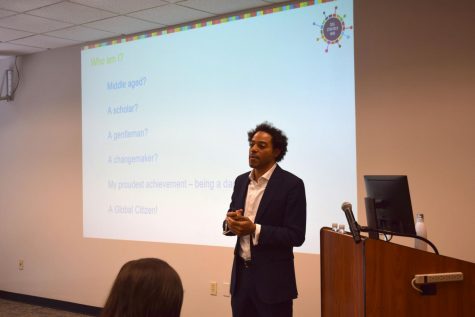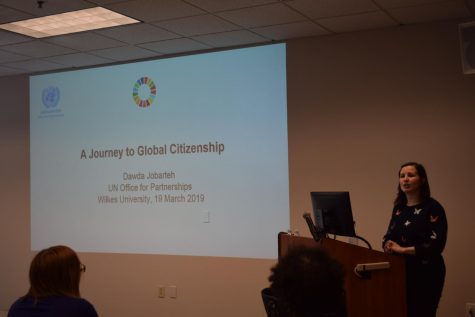UN Lecture Series features UN Rep. Dawda Jobarteh
The United Nations Lecture series was brought to Wilkes University this past Tuesday with another lecture being offered next week. This series is partnered with the Humpty Dumpty Institute’s Higher Education Alliance for the United Nations to connect UN officials to students.
Wilkes welcomed Dr. Dawda Jobarteh, the Global Head of the UN SDG Strategy Hub for their most recent lecture series on Tuesday, Mar. 19 where he talked about the idea of global citizenship.

Jobarteh’s lecture was titled ‘A Journey to Global Citizenship’ where he touched on his own life as well his position at the SDG Strategy Hub.
Jobarteh’s beginnings started with connecting to his Gambian and Argentine roots. He was born in Kenya and raised in New York City. He holds a Ph. D and a master’s degree in War Studies from King’s College London, and a bachelor’s degree from Emory University.
Ever since Jobarteh was little, he always felt very fortunate and had a passion to give back. He went to an international school through grades K-12. His friends were from different countries and acknowledged that he never saw “in color.” Once he left New York City to find his path in higher education, he quickly realized he was living in a bubble of naivety.
He went to an American University in Georgia where people labeled him as black. This was the first time that Jobarteh saw himself being racially identified. Being that he does not see in color, Jobarteh believes that one must put in the work to project themselves in the way they want to be seen by others.
During his sophomore year of college, he was given the opportunity to study abroad in Australia. The professors that traveled with him did not take him seriously. They stereotyped him; believing he only wanted to party while abroad.
In reality, Jobarteh wanted to learn the Australian culture and their way of teaching/educating.
Jobarteh then recalled a time when his primary school teacher said he would never graduate high school in which he agreed because he was not studying what he wanted. He set out to prove her wrong and pursued graduate school so he could study what he wanted to. He was able to visit Gambia and Argentina where he first witnessed true poverty. This is where his direction in life became clear.
He was given the opportunity to work for two presidents. During graduate school, he was offered a job that focused on research and poverty toward African leaders. Accepting the job, he was curious to see decision making in a power field and how to instill change. This was just the beginning of his climb to social impact.
Jobarteh became the Managing Director of MIT Solve and worked at the United Nations in the Executive Office of the Secretary-General on strategic partnerships related to sustainable development and climate change.
Prior to that position, he managed a multi-million-dollar partnership at a private sector company providing communities with reliable, affordable, and safe water in three West African countries. He also worked at the Africa Progress Panel where he was the Acting Director and the Head of Research and Policy.
Currently, Jobarteh is the Global Head of the UN Sustainable Development Goals (SDG) Strategy Hub, located in the United Nations Office for Partnership. The SDG Strategy Hub is aimed at catalyzing SDG advocacy and coordination to inspire action.
Jobarteh explained the Sustainable Development Goals are based on the Millennium Development Goals from 1999. These eight goals were created to hail as a plan for how the world should develop. These goals were achieved because of how they were written.
Jobarteh did not want a particular section of life to get left behind, so the SDG documents were written so every sector of life has a responsibility. These include 17 goals to accomplish between years 2015-2030. The Strategy Hub based on the SDG is run by Jobarteh aiming to reach over the bureaucracy of government to push further. He helps to understand how to deliver goals listed and minimize the rise of nationalism.
Jobarteh’s day-to-day life includes thinking about how things can be done differently and doing so. He said if one tries to innovate, they cannot do the same thing and expect something different to happen. Jobarteh said that businesses always have to grow, and that is the same mindset as the UN. Without said goals, things will not change.
If Jobarteh could talk to his 20-year-old self, he would say it is okay not to have all the answers. Be curious and seek answers out, then piece all of that information together. Ask questions and be humble. His regrets are looked at as a way to learn about failure.

Dr. Andreea Maierean introduced the speaker, Jobarteh. This lecture marked the beginning of the spring UN lecture series.
Dr. Andreea Maierean, Coordinator of international studies and an Assistant Professor of political science commented on Jobarteh’s lecture.
“We greatly enjoyed the lecture… The speaker was charismatic, energizing, and engaging. Student feedback has been very positive as they have found him witty, relatable and informative,” Maierean said.
Courtney Corona, a political science major, went to Jobarteh’s lecture and found it inspiring.
She said she found it inciteful to see that he had no direct path when pursuing higher education. His main goal is to help people and make an impact on the world, she added. No matter what stopped him along his journey, he always made sure he was making an impact on society.
Jobarteh finished his presentation by explaining that a plastic straw breaks down in 100 years yet remains on Earth for 450 years. Cleaning up beaches is a great step to becoming environmentally friendly, however, the mindset of how we use plastic in the first place is what needs to change.
“Everyone can learn from everyone,” Jobarteh said. “It is free to be nice.”
Cabrini is a senior psychology and communication studies double major. She also holds a minor in women and gender studies.
Cabrini started as a staff...